|
De Amerikaanse schrijfster Jane Smiley werd geboren op 26 september 1949 in Los Angeles. Zie ook alle tags voor Jane Smiley op dit blog en ook mijn blog van 26 september 2010
Uit: A Thousand Acres
“Acreage and financing were facts as basic as the name and gender in Zebulon County. Harold Clark and my father used to argue at our kitchen table about who should get the Ericson land when they finally lost their mortgage. I was aware of this whenever I played with Ruthie Ericson, whenever my mother, my sister Rose, and I went over to help can garden produce, whenever Mrs. Ericson brought over some pies or doughnuts, whenever my father loaned Mr. Ericson a tool, whenever we ate Sunday dinner in the Ericson's kitchen. I recognized the justice of Harold Clark's opinion that the Ericson' land was on his side of the road, but even so, I thought it should be us. For one thing, Dinah Ericson's bedroom had a window seat in the closet that I coveted. For another, I thought it appropriate and desirable that the great circle of the flat earth spreading out from the T intersection of County Road 686 and Cabot Street be ours. A thousand acres. It was that simple.
It was 1951 and I was eight when I saw the farm and the future in this way. That was the year my father bought his first car, a Buick sedan with prickly gray velvet seats, so rounded and slick that it was easy to slide off the backseat into the footwell when we went over a stiff bump or around a sharp corner. That was also the year my sister Caroline was born, which was undoubtedly the reason my father bought the car. The Ericson Children and the Clark children continued to ride in the back of the farm pickup, but the Cook children kicked their toes against a front seat and stared out the back windows, nicely protected from the dust. The car was the exact measure of six hundred forty acres compared to three hundred or five hundred. »
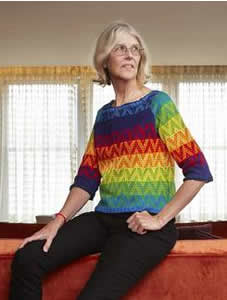
Jane Smiley (Los Angeles, 26 september 1949)
De Russische schrijver en dissident Vladimir Nikolajevitsj Vojnovitsj werd geboren in Doesjanbe op 26 september 1932. Zie ook alle tags voor Vladimir Vojnovitsj op dit blogen ook mijn blog van 26 september 2010
Uit: Monumental Propaganda (Vertaald door Andrew Bromfield)
“A large statue of Stalin stood in the center of Dolgov on Stalin Square, formerly Cathedral Square, formerly the Square of the Fallen. It had been erected in 1949 in honor of Stalin’s seventieth birthday, on her—that is, Aglaya’s—initiative. At that time Aglaya was the first secretary of the district Party committee, but even she had been forced to overcome opposition. Everyone understood what great educational importance the monument could have, and no one dared oppose it directly, but secret enemies of the people and demagogues had raised their heads to object, citing the present state of postwar devastation. They incessantly reminded everyone that the district suffered delays and irregularities in deliveries of foodstuffs, that the people were destitute and swollen-bellied from hunger and the time was not yet right for grandiose projects that were too great a burden on the local budget.
One of the monument’s main opponents had been Wilhelm Leopoldovich Livshits, editor-in-chief of the newspaper Bolshevik Tempos. He wrote an article called “Bronze Before Bread” and published it in his newspaper. In it he stated that monumental propaganda was, of course, a matter of great importance—Lenin himself had emphasized that it was a matter of great importance—but did we have the moral right today to spend so much money on a monument when our people were suffering? “Just whose ‘ours’ and ‘yours’ are these?” Aglaya inquired in a letter to the editor, in which she also explained that our Russian people are long-suffering, they would tighten their belts still further, they would suffer in the short term, but the monument erected by them would endure forever. In his reply Livshits informed her that all of us have only one people, the Soviet people, and that the monument was indeed essential, but it could be erected later, when the economic situation in the district and the country as a whole improved. He even had the effrontery to enlist Stalin himself as one of his allies. According to Livshits, Stalin, being wise and modest, would not have approved such prodigal expenditure at an hour of such great difficulty for the Motherland.”
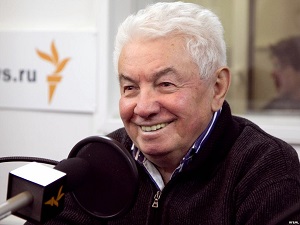
Vladimir Vojnovitsj (Doesjanbe, 26 september 1932)
De Nigeriaanse schrijver Cyprian Ekwensi werd op 26 september 1921 in Nigeria geboren in Minna. Zie ook alle tags voor Cyprian Ekwensi op dit blog.
Uit: Jagua Nana
“She stored away the food, then she took out her towel and went to the bathroom, but when she knocked a man answered her from the inside and she went instead to the lavatory. The same old bucket, piled high; the floor messed about, so she could see nowhere to her silver sandals. It was all done by those wretched children upstairs.
Why blame them when their mothers did not know better.
...The unpleasant side of Lagos: the flies in the lavatory- big and blue and stubborn - settled on breakfast yam and lunch-time stew (they were invisible in a stew with greens). But Jagua closed her eyes and shut her nostrils with her town.
(…)
Jagua followed Rosa to the outskirts of lagos, to the slum of slums, a part of the city which she had often heard of, but had never visited. (...) Filth was scattered everywhere in the surroundings. (...) Jagua looked at the degradation. Bare floor which came off in powdery puffs if you rubbed your foot too hard. The bed was in the same room, wooden, with a mattress stuffed with the kind of grass cut by prisoners at the racecourse.”
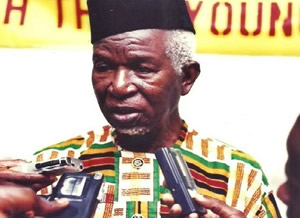
Cyprian Ekwensi (26 september 1921 - 4 november 2007)
De Oostenrijkse schrijver Peter Turrini werd geboren op 26. September 1944 in St. Margarethen im Lavanttal. Zie ook alle tags voor Peter Turrini op dit blog.
Uit: Wie verdächtig ist der Mensch ?
“Es gibt die schöne Geschichte vom Buben auf dem Lande, dem ein Lehrer oder ein Pfarrer ein Buch gibt und dem sich die Welt der Phantasie eröffnet. Der Bub liest und liest, wird gescheiter und gescheiter, und eines Tages wird er, der arme Bub vom Lande, Lehrer oder Professor oder Pfarrer.
Die Geschichte ist als Biographie denkbar, auch meine gleicht ihr ungefähr, und doch ist sie eine Illusion: sie verschweigt, weil sie von der glücklichmachenden Moral des Aufsteigens ausgeht, den Preis, den dieser Aufstieg kostet.
Sie unterschlägt die andere Geschichte, die unter der schönen liegt, die Geschichte der Entfremdung von seiner Umgebung, den Verlust sozialer Wirklichkeit, die Einsamkeit des Aufsteigenden, des Lesenden.
Die ersten Geschichten, die ich aufgenommen habe, waren erzählt. Meine Mutter erzählte uns Buben vor dem Einschlafen Geschichten, denen eines gemeinsam war. In ihnen herrschte Gerechtigkeit, wurde Aggressivität bestraft und Gutsein belohnt. Gute Taten, auch wenn sie im Verborgenen blühten, bekamen ihren gerechten Lohn, und schlechte Taten, selbst der geheimste Diebstahl, wurden früher oder später entdeckt. Meine Mutter hatte die Fähigkeit, die Dramaturgie der Geschichten zu kürzen oder zu strecken, je nachdem, ob wir müde waren oder munter. Die Moral der Geschichte, Strafe oder Lob, stellte sich früher oder später ein, sie kam unausbleiblich. Die Gerechtigkeit hatte etwas Selbstverständliches und gleichzeitig Überirdisches. Sie traf ein wie ein Naturgesetz, die Menschen mochten sich verhalten, wie sie wollten, es kam der Moment des Gerichts und des Einschlafens.
Außerhalb dieser Geschichten, im Leben des fünfjährigen Buben vom Lande, sah alles anders aus. Mein Vater war ein italienischer Kunsttischler, den es in den dreißiger Jahren nach Kärnten verschlagen hatte. Seine Sprache, dieses Gemisch von Kärntnerisch und Italienisch, seine ganze Art, paßte nicht in die bäuerliche Umgebung.“
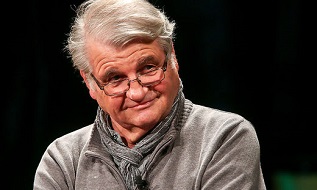
Peter Turrini (St. Margarethen im Lavanttal, 26. September 1944)
De Australische dichter en schrijver Joseph Furphy werd geboren op 26 september 1843 in Yering, een voorstad van Melbourne. Zie ook alle tags voor Joseph Furphy op dit blog.
The Bullfrog Bell
Now the truce of night brings respite to the sordid care of day,
And in listlessness I pace the river side,
Where the solitude is wounded by no lighted window's ray;
But illicit fancy will not be denied
For the darkening flat reiterates a freer life's farewell,
In the long familiar knocking of a bullfrog bell.
And in reverie I see the loaded waggons slowly creep,
Far across the western plains of New South Wales;
With 'talking' wheels and platforms, with wool-ropes biting deep,
And the dust of two broad countries on the vales.
Till the stars take shape in patterns, and through their dreamy spell
Comes the low, incessant knocking of the bullfrog bell.
And the retrospection lingers, bringing spiritless regret,
Though the northward track is open to me still
I may count the morning muster — I may track the stragglers yet
I may spell or battle onward, as I will
I may wake at night to listen, and know that all is well
By the reassuring answer of the bullfrog bell.
But that virile life repeated would be wearisome and trite,
Since the glamour of adventure cannot last
When the future, with its freshness, its pulsing, roseate light,
Has congealed into a leaden-coloured Past.
So an unreturning era owns its sympathetic knell
In the melancholy knocking of that bull-frog bell.
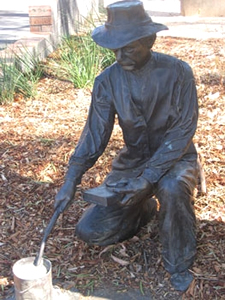
Joseph Furphy (26 september 1843 - 13 september 1912)
Standbeeld inShepparton
Zie voor onderstaande schrijver ook mijn blog van 26 september 2010.
De Engels schrijver, dichter en germanist Edwin Keppel Bennett werd geboren op 26 september 1887 in Wareham, Dorset.
26-09-2015 om 13:19
geschreven door Romenu 
Tags:Jane Smiley, Vladimir Vojnovitsj, Cyprian Ekwensi, Peter Turrini, Joseph Furphy, Edwin Keppel Bennett, Romenu
|

